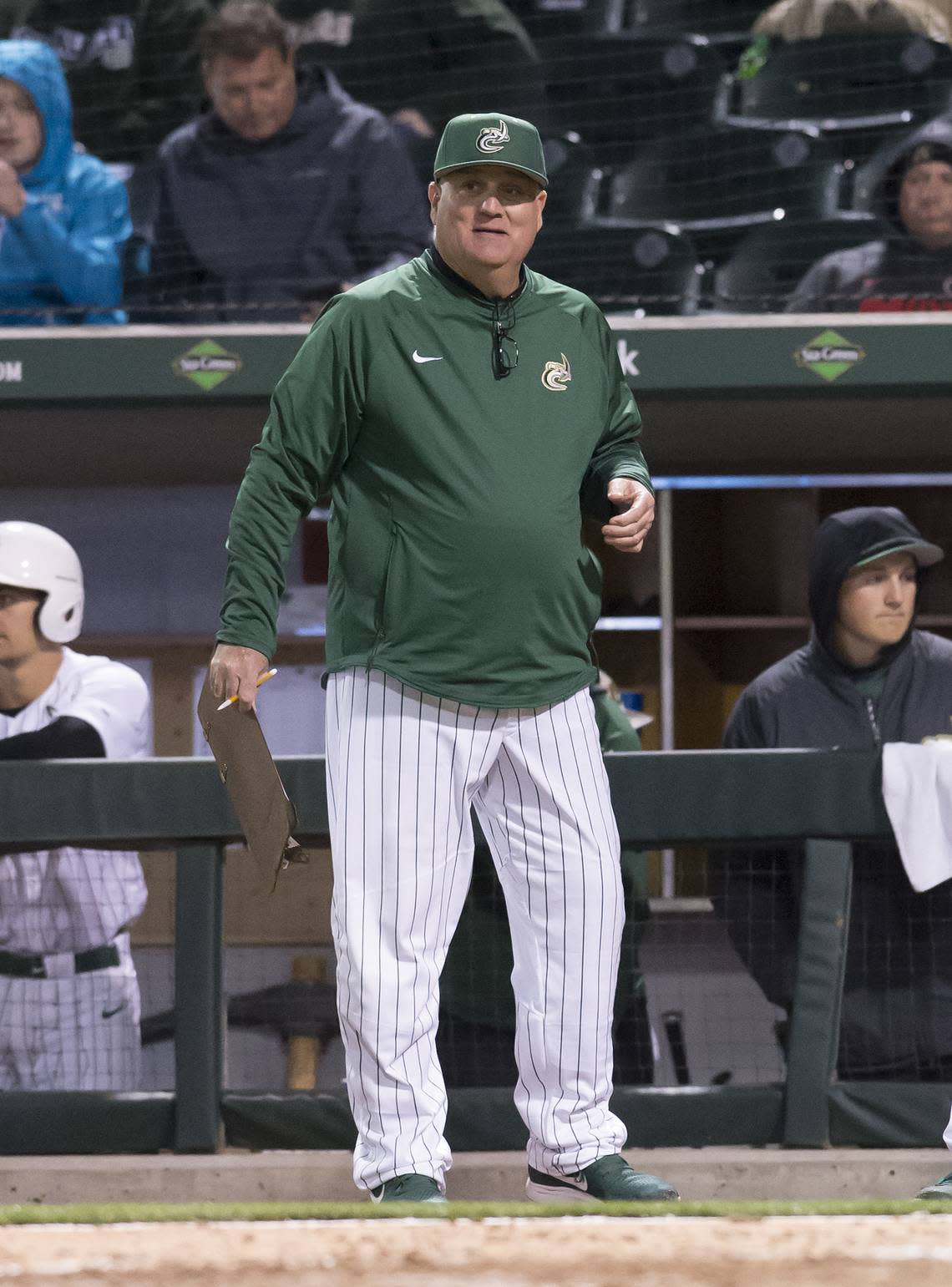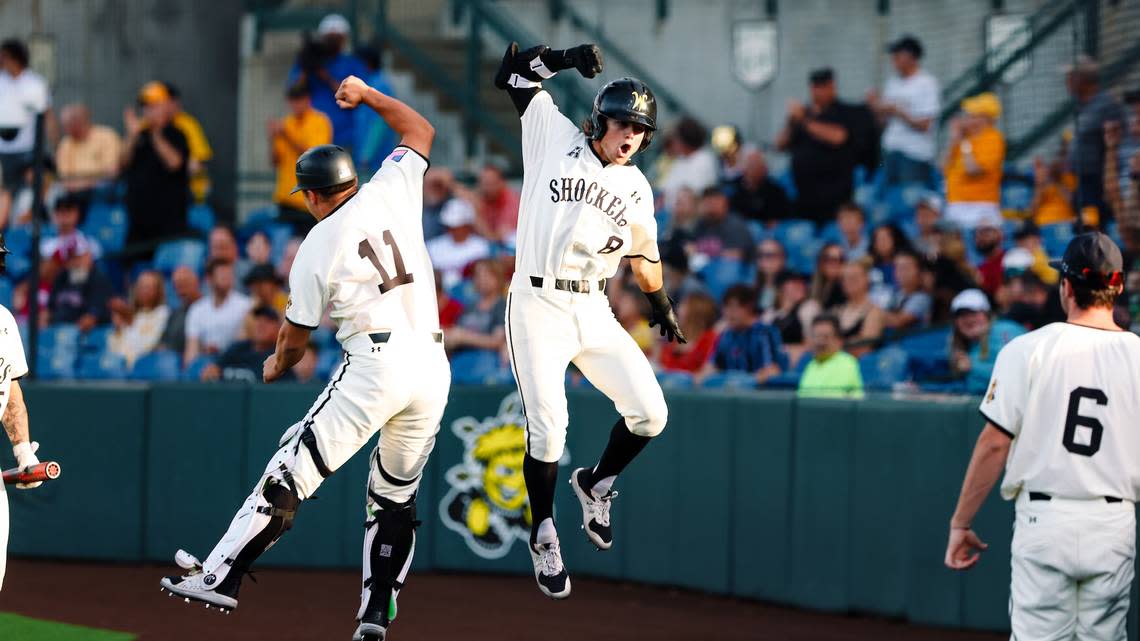How coach Loren Hibbs kept Wichita State Shockers baseball steady in a time of turbulence
His voice trembles in excitement when the conversation shifts to competition.
It’s a bitterly cold January day, but Loren Hibbs is breathing fire inside the Wichita State baseball offices at Eck Stadium.
“You don’t play for Gene Stephenson and then be crazy enough to come coach for the guy if you don’t have a serious competitive nature,” Hibbs said. “I’m not as outwardly expressive about it as some people who have come through this program, but man, I’m getting fired up just talking to you about competing.”
This situation seemed improbable not even four years ago when Hibbs retired as head coach at Charlotte to follow Eric Wedge to WSU to try to pull off one of college baseball’s ultimate restoration projects. In fact, when he came in 2019, Hibbs was positive his days of leading a program were finished.
And yet, Hibbs finds himself the head man in charge of the Shockers with the start of the 2023 college baseball season less than three weeks away.
The 61-year-old understands outside perception; he is the stop-gap solution following Wedge’s mysterious exit from the program in December, a band-aid to keep the program together through this season until new athletic director Kevin Saal can hand-pick his own head coach.
But in an exclusive interview with The Eagle, Hibbs made it clear the challenge to lead again has replenished his competitive fire and he is more invested than ever to finish the job he returned to Wichita to do — restore Shocker baseball to a powerhouse — even if it means sticking around past his interim tag.
“My focus right now is on our players and on our coaches to get ready to play this season, pure and simple,” Hibbs said. “I can’t control what happens in the future. I’ve never worried about the future ever. Right now I’m just focused on providing these kids with a good experience because they’ve been through some things. It hasn’t been easy for them. But we’ve got a really good group of guys.”

‘I got out of the Wichita bubble’
Hibbs isn’t the typical fall-back option available to a program when it makes a head coaching change two months before the start of the season.
He came with 27 years of head coaching experience at Charlotte, where he won 819 games, seven conference championships, four conference tournament titles and logged five NCAA regional appearances.
While Hibbs and Saal declined to discuss Wedge’s exit, Hibbs did say his outside experience at the NCAA Div. 1 level can help the program moving forward.
“We took over a really bad situation (at Charlotte), but we made it into something really good and stayed there for 27 years,” Hibbs said. “I never thought I would stay there that long. I thought I was going to go in there and clean it up and get out and go to another job. But I learned a lot and I think it really helped me for the situation that we’re in right now because I got a different perspective. I got out of the Wichita bubble.”
For a former Shocker accustomed to competing for championships and trips to Omaha, Hibbs said last season took a toll on him when WSU posted a 21-36 record, tied for the fewest wins in a season since the program returned in 1978.
He’s already introduced changes to WSU’s practice habits since assuming control of the team.
“There’s going to be some things we’re going to adjust in terms of how we do things on a daily basis,” Hibbs said. “There are going to be some things that our players will buy into that have been proven to be successful for a long period of time.”
But do the methods that made the Shockers a dynasty in the 1980s still work in 2023? Hibbs is optimistic.
“One of the concerns you have as a head coach in today’s era is can you be hard on the players? Can you push them? At the end of the day, you’ve got to be able to do that,” Hibbs said. “If they don’t respond well to that, then you’ve got some issues. I will say, when we pushed this group, they didn’t back down one bit. So that makes me sleep a little bit better at night.”
Hibbs, known affectionately as “Scooter” in the program, was groomed by Gene Stephenson and mentored by many other all-time college baseball coaches, like LSU’s Skip Bertman, Oklahoma State’s Gary Ward, Arkansas’ Norm DeBriyn and Mississippi State’s Ron Polk.
He’s an old-school coach with a soft spot for the new-age technology, a new taste developed in recent years working closely with WSU volunteer assistant Conor Behrens and director of video and analytics Nate Brisco.
“I know a lot of people don’t like it, but I like the numbers. I like the exit velo and launch angles and strike percentages in certain counts,” Hibbs said. “I like getting as much information as I can get on an opponent. And we can use those numbers as tools to help each of our players and help our guys get better. So I welcome it and I look forward to using that information, along with the eye test and what we see in front of us, to help our program move forward.”
The college baseball world and how the game is played have changed greatly in the three decades since he left WSU when it was among the nation’s best. But the one thing Hibbs is confident hasn’t changed is how competitors find ways to win.
How to compete is the one thing Hibbs is adamant about teaching WSU before it opens the season with a 3-game road series at Long Beach State from Feb. 17-19.
“Competing is not about doing it whenever you feel good,” Hibbs said. “It’s every single day. That’s one of the things you start checking boxes on what we want to do with this program. We want to get that competitive spirit back. When it’s tied in the eighth inning, we know we’re going to find a way to win. I look forward to getting a chance to pass that onto our players.”

‘We would run through a brick wall for those guys’
When Wedge took a leave of absence near the end of WSU’s fall season and it became apparent he would not return in the spring, the veteran players on WSU’s roster called a players-only meeting.
“We got the first-year and second-year guys together and were just like, ‘This is where you want to be.’ We don’t need guys leaving just because of a little bit of adversity,” WSU senior Sawyre Thornhill said. “We’re a team and we needed everyone to be there.”
Players could have looked for a new home when the team scattered for winter break. But in a testament to the belief in the remaining coaching staff, WSU didn’t lose a single player to the transfer portal.
Hibbs heaps all of the credit on pitching coach Mike Pelfrey and assistant coach Mike Sirianni, who worked more closely with the players last season and forged bonds that convinced WSU’s players to ultimately remain in Wichita.
“The biggest thing I brought was stability,” Hibbs said. “When you see the look on a 22-year-old kid’s face and they can exhale and say, ‘OK, coach Hibbs is going to be here, coach Sirianni is going to be here, coach Pelfrey is going to be here, coach Behrens is going to be here, coach Brisco is going to be here.’ Now we know what direction we’re going in and we can start to work to move this thing forward.”
“I think we all had a lot of weight lifted off of our shoulders when we found out that Scooter was going to be our coach,” Thornhill said.
WSU star Brock Rodden, the preseason American Athletic Conference Player of the Year, said the players stayed because of their confidence in Hibbs and the coaching staff.
“I think that speaks really highly about our coaching staff to not have a single guy transfer out after a head coaching change,” Rodden said. “That speaks volumes about Sirianni and Pelfrey and Behrens and especially Hibbs. We would run through a brick wall for those guys, for sure.”
Just as impressive, Sirianni, the team’s recruiting coordinator, and Pelfrey were able to keep all 16 players who were committed to WSU before the coaching change. The class has been hailed by national recruiting services as a top-40 group in the country.
There’s little pomp surrounding the program from a national perspective entering the season. The Shockers’ postseason drought is approaching a decade and they are once again pegged to be a bottom-half team in the American.
But internally, there’s optimism that WSU can be one of the surprise teams in the country this season. The Shockers feel like they should have an electric offense with bats like Rodden, Thornhill, Payton Tolle, Chuck Ingram, Jordan Rogers and Seth Stroh returning, plus a trio of instant-impact newcomers in Garrett Pennington, David Herring and Kyte McDonald. Pitching remains a question, but WSU has a host of intriguing new arms this season.
Undergoing a coaching change on top of that has only strengthened the team’s bond, players say.
“The more adversity you go through, I think that brings your team closer together,” Tolle said. “We’re a family. We like each other. I like hanging out with these guys outside of baseball. It’s exciting that we all came together and nobody turned their back on each other. We all want to be here and be together.”
No one knows if Hibbs will be the one to help bring them together for longer than this season. Saal said he will keep all options open and reassess the situation following this season.
Regardless of what happens, Hibbs very well could be the perfect person to handle this season.
“Scooter probably knows the game of baseball better than anybody,” Thornhill said. “But more importantly, he played here, he coached here, he knows the culture here and he knows what the culture needs to be like to be successful.”
